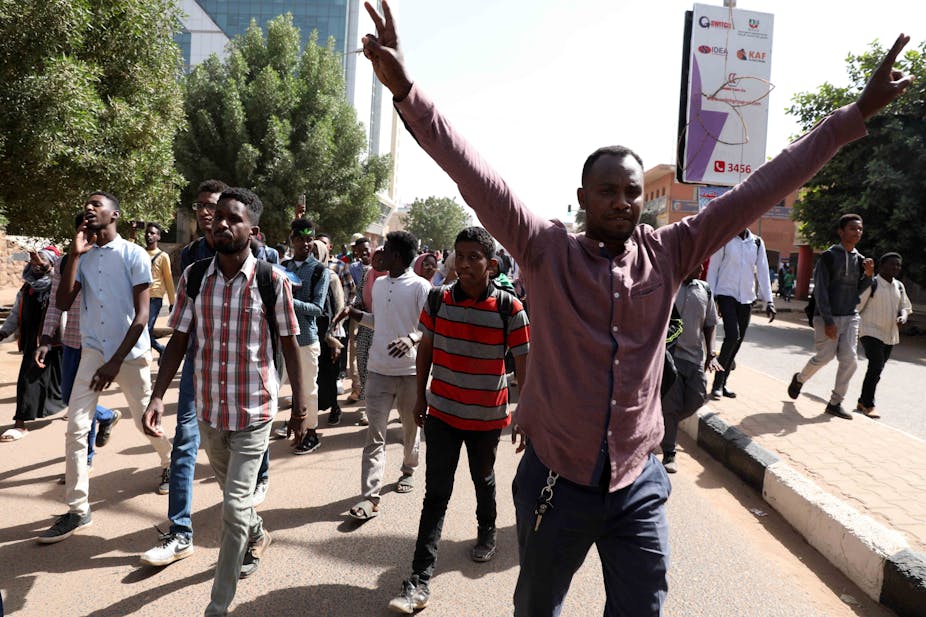Just under a year ago, Sudan’s long-time dictator, Omar al-Bashir, was ousted from power. He was replaced by an 11-member sovereign council and technocratic government which will run the country until 2022.
There have been growing calls in recent months to have Sudan removed from the US list of state sponsors of terrorism. Sudan was put on the list in 1993 for “supporting international terrorist groups” and remained on the list for hosting Osama bin Laden, supporting the bombing of the US embassies in Tanzania and Kenya in 1998, and attacking the USS Cole in 2000.
The calls have come from Sudan’s new Prime Minister Abdallah Hamdok, the African Union and former American president Jimmy Carter, among others.
These calls aren’t without merit. Hamdok has taken some steps to make amends and move on from the past. For example, the new Sudanese government has promised to compensate the victims of the embassy bombings and the attack on USS Cole.
This signals Sudan’s acknowledgement that it was involved in the terror attacks. But that’s not enough. The country would also have to cut ties with Hamas and Hezbollah, and try to forge new ties with regional US allies like Israel. This would signal to the Trump administration Sudan’s willingness to distance itself from terror.
In a bid to uproot the previous government’s deeply planted state structures, Hamdok has announced the establishment of a law reform commission, sacked university chancellors and the head of the Sudanese Broadcasting Corporation, and dismissed the undersecretary of the federal governance ministry.
He has also voiced his commitment to the principle of equal citizenship, including freedom of religion and gender equality.
The US government has reciprocated. In November 2019, it allowed Sudan’s Nile Bank to sign an accord with US software firm Oracle Corp for the provision of a mobile banking platform. This agreement would give Nile Bank access to Oracle’s mobile banking systems. The two countries have also agreed to exchange ambassadors for the first time in 23 years.
Hamdok’s keenness to get off the terror list is economic: he wants to be able to access aid, foreign investment and financial assistance. The list restricts the US government from giving foreign investment or assistance to Sudan. The current ban covers weapons and ammunition sales. It also means that the US can block Sudan from accessing loans from bodies such as the World Bank and International Monetary Fund.
Hamdok is sitting on a sick economy. Simply removing Sudan from America’s terror list won’t work wonders. Its economic problems go deeper than needing aid, foreign investment and loans. It needs to strengthen its banking systems, curb illicit activities and eliminate shadow economies that don’t report their income. It also needs to reform the state security sector, strengthen institutions and recover the millions stolen during the previous regime.
The history
Former US president Barack Obama signed an executive order in January 2017 to reduce the restrictions on the Sudanese government imposed under the Clinton administration. His aim was to reduce conflict and improve access to humanitarian aid.
Sudan was expected to:
-
Cooperate on counter terrorism;
-
Improve human rights, including freedom of religion and the press;
-
Increase humanitarian access, which Sudan has recently started to do; and
-
End fighting and conflicts with rebels within Sudan.
Sudan also had to show that it had stopped supporting terrorism and severed ties with North Korea.
Its cooperation on counter terrorism has been acknowledged by the Trump administration.
What’s missing
The new technocratic government has started to disentangle some business and military links that have roots in the old regime. But, structurally, things in Sudan remain largely the same. There hasn’t been enough time to erase the former regime’s influence.
In my view, Sudan isn’t ready to be removed from the list. Rather, regional and international partners and organisations need to continue to support the country through this delicate and complex democratic transition.






